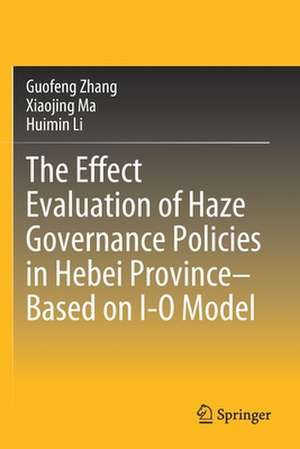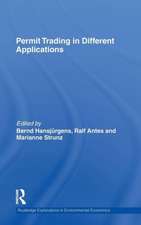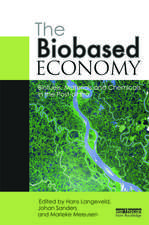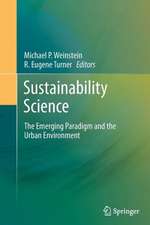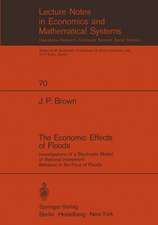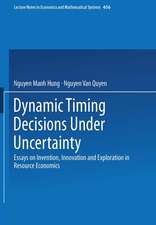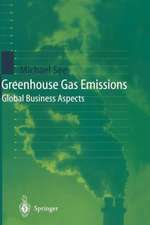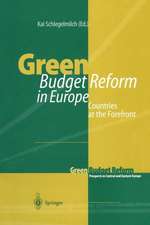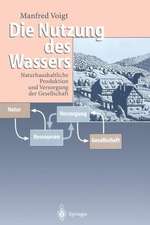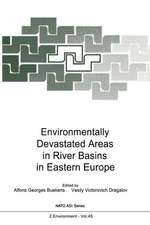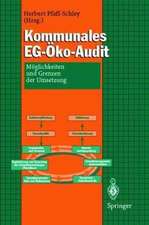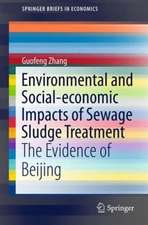The Effect Evaluation of Haze Governance Policies in Hebei Province–Based on I-O Model
Autor Guofeng Zhang, Xiaojing Ma, Huimin Lien Limba Engleză Paperback – 5 mar 2021
This book is divided into five parts. The first part is an introduction. This paper mainly introduces the research background, research status at home and abroad, the purpose and significance of the study, the content and methods of the study, the key scientific problems to be solved and the expected results. In the second part, the current situation and existing problems of economic, social, energy and environment development in the study area are analyzed in detail. In the third part, a comprehensive evaluation model of dynamic optimization of haze control policy is constructed. The fourth part carries on the simulation experiment, and carries on the analysis to the experimental result. The fifth part puts forward the policy suggestions to realize the economic, social, energy and environmental development of Hebei Province.
In this book, we have some understandings about haze governance. From the perspective of policy effect, thepolicy effects of subsidy for soil and water conservation, subsidy for development and utilization of clean energy, subsidy for new energy vehicles, motor vehicle restriction and subsidy for introduction of PM2.5 treatment technology are decreasing. Comprehensive policy can better achieve the goal of sustainable development of economy, energy and environment than single policy, and the effect of "source governance" policy is better than that of "end governance" policy.
| Toate formatele și edițiile | Preț | Express |
|---|---|---|
| Paperback (1) | 378.54 lei 6-8 săpt. | |
| Springer Nature Singapore – 5 mar 2021 | 378.54 lei 6-8 săpt. | |
| Hardback (1) | 385.62 lei 6-8 săpt. | |
| Springer Nature Singapore – 5 mar 2020 | 385.62 lei 6-8 săpt. |
Preț: 378.54 lei
Nou
Puncte Express: 568
Preț estimativ în valută:
72.43€ • 75.83$ • 59.93£
72.43€ • 75.83$ • 59.93£
Carte tipărită la comandă
Livrare economică 05-19 aprilie
Preluare comenzi: 021 569.72.76
Specificații
ISBN-13: 9789811537592
ISBN-10: 9811537593
Pagini: 112
Ilustrații: XII, 112 p. 58 illus., 53 illus. in color.
Dimensiuni: 155 x 235 mm
Greutate: 0.19 kg
Ediția:1st ed. 2020
Editura: Springer Nature Singapore
Colecția Springer
Locul publicării:Singapore, Singapore
ISBN-10: 9811537593
Pagini: 112
Ilustrații: XII, 112 p. 58 illus., 53 illus. in color.
Dimensiuni: 155 x 235 mm
Greutate: 0.19 kg
Ediția:1st ed. 2020
Editura: Springer Nature Singapore
Colecția Springer
Locul publicării:Singapore, Singapore
Cuprins
Chapter 1 Introduction.- Chapter 2 Analysis of the current situation of research areas.- Chapter 3 Dynamic and optimal comprehensive evaluation model of haze control policy in Hebei province.- Chapter 4 Scenario analysis of comprehensive impact of haze control policy on economy, society and environment in Hebei province.- Chapter 5 Research conclusions and policy recommendations.
Notă biografică
Zhang Guofeng, male, born in 1981, Ph. D. , Associate Professor, School of Economy and Trade, Hebei GEO University, research interests include environmental economics and resource economics.
Ma Xiaojing, female, born in 1983, Ph. D. , lecturers, School of Resources, Hebei GEO University, research interests include geology, environmental economics and resource economics.
Li Huimin, female, School of Economics and Management, Inner Mongolia University of Technology, research interests include environmental economics and Finance.
Textul de pe ultima copertă
This book provides a dynamic simulation model based on input-output table. The model includes an objective function, i.e. maximizing economic and social development and three sub-models, including economic growth model, pollutant emission model and energy balance model. The data of 2012 is selected as the base period data. The haze control policy of Hebei Province is written into the model as an exogenous variable. Reducing the total PM2.5 emissions is an environmental constraint, which is used to eliminate the impact of natural factors on environmental quality. Lingo software is used to simulate this model. By comparing the socio-economic impacts in different scenarios, this book found the most effective policy combination of haze governance. Comprehensive haze governance policy recommendations provide experience for other regions of China and other developing countries. In this book, the dynamic simulation model of haze governance also provides a reference to other environmental policy simulations.
This book is divided into five parts. The first part is an introduction. This paper mainly introduces the research background, research status at home and abroad, the purpose and significance of the study, the content and methods of the study, the key scientific problems to be solved and the expected results. In the second part, the current situation and existing problems of economic, social, energy and environment development in the study area are analyzed in detail. In the third part, a comprehensive evaluation model of dynamic optimization of haze control policy is constructed. The fourth part carries on the simulation experiment, and carries on the analysis to the experimental result. The fifth part puts forward the policy suggestions to realize the economic, social, energy and environmental development of Hebei Province.
In this book, we have some understandings about haze governance. From the perspective of policy effect, thepolicy effects of subsidy for soil and water conservation, subsidy for development and utilization of clean energy, subsidy for new energy vehicles, motor vehicle restriction and subsidy for introduction of PM2.5 treatment technology are decreasing. Comprehensive policy can better achieve the goal of sustainable development of economy, energy and environment than single policy, and the effect of "source governance" policy is better than that of "end governance" policy.
Caracteristici
A dynamic comprehensive evaluation model for haze pollution governance policy was constructed based on input-output table Evaluating and predicting the effects of haze governance policies in Hebei Province, China Comprehensive haze governance policy recommendations provide experience for other regions of China and other developing countries
